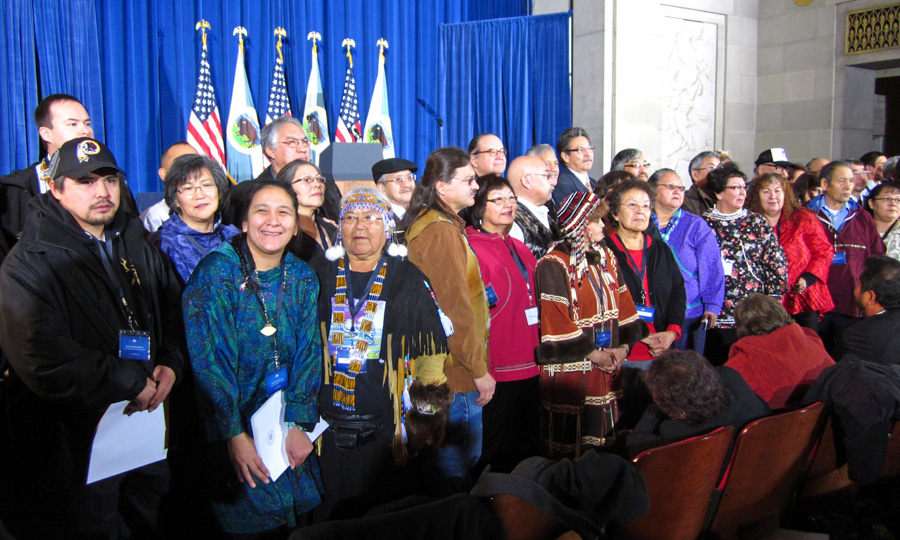Alaska Native leaders gather for pictures at the start of the White House Tribal Nations Conference.
Photos and Story by Libby Casey, APRN -Washington, DC
President Obama pledged to keep listening to and advocating for Alaska Natives and Native Americans on Thursday, at his second Tribal Nations Summit. The Interior Department in Washington hosted hundreds of leaders from the country’s federally recognized tribes, including those from Alaska, who filled the front rows of the auditorium.
His biggest announcement was that the US will sign on to the United Nations Declaration on the Rights of Indigenous Peoples – something Alaska leaders said going into Thursday’s conference was a top priority.
![OBAMA1[1]](https://media.alaskapublic.org/wp-content/uploads/archive/aprn/wp-content/uploads/2010/12/OBAMA11.jpg) “Recognizing that no statement can undo the damage that was done, what it can do is help reaffirm the principals that should guide our future,” Obama said. “It’s only by heeding the lessons of our history that we can move forward. And as you know in April we announced we were reviewing our position on the UN Declaration of Indigenous Peoples. And today I can announce the United States is lending its support to this declaration. “
“Recognizing that no statement can undo the damage that was done, what it can do is help reaffirm the principals that should guide our future,” Obama said. “It’s only by heeding the lessons of our history that we can move forward. And as you know in April we announced we were reviewing our position on the UN Declaration of Indigenous Peoples. And today I can announce the United States is lending its support to this declaration. “
The US was one of only a handful of nations who refused to sign the Declaration back in 2007. It protects the rights of Native people worldwide, and affirms their rights to traditions and culture. The Bush Administration complained that it might conflict with the relationship between the United States government and tribes, but President Obama said it was time to sign on.
“The aspirations it affirms, including the respect for the institutions and rich cultures of native peoples are one we must always seek to fulfill.”
Obama said what matters more than words are actions to match those words – and that, he said, is what Thursday’s conference was about.
He touched on highlights of the past year: passage of the Indian Health Care Improvement Act, which is part of the larger health care overhaul still under fire from Republicans. He talked about signing the Tribal Law and Order Act this summer, and the recent settlement of the Cobell case, a long-running battle over government mismanagement of billions of dollars in royalties for Indian trustees.
President Obama says he hopes to change the level of faith tribes have with the federal government.
“The truth is for a long time Native Americans implicitly told they had a choice to make. By virtue of the longstanding failure to tackle the wrenching problems in Indian Country, you had to either abandon your heritage or accept a lesser lot in life. But there was no way to be a successful part of America and a proud Native American. But we know
that is a false choice. To accept it is to believe we can’t and won’t do better. And I won’t accept that. I know there’s not a single person in this room who accepts that either.
After President Obama spoke, tribal leaders met in break-out sessions with Cabinet Secretaries and other administration officials. Issues ranged subsistence rights, to justice, to health issues, and how the federal government can support tribes better in disputes with states.
Justice Department Assistant Attorney General Ignacia Moreno said she heard from Alaskans that their issues are unique, and may deserve individual attention.
“A summit on Alaska Native issues,” she said. “There was a thinking that there’s something that needs to be addressed in separate context, and that maybe having just a summit on that would be helpful.”
Interior Secretary Ken Salazar closed out the day by promising that the White House is listening.
“I think we have shown that we have turned the page, and we are doing a lot and have accomplished a lot, but also recognize the reality, we have a lot more to do,” Salazar said. “You don’t undo 400 years of history in 18-19 months. But under this president’s commitment, his leadership, and his direction to his cabinet, we are well on our way.”
Download Audio (MP3)





